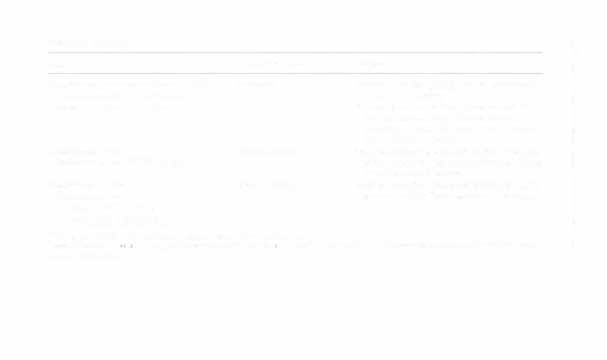i bc27f85be50b71b1 (161 page)
Read i bc27f85be50b71b1 Online
Authors: Unknown

Table 8-7. Laboratory Tests for the Hepatic, Biliary. and Pancreatic Systems'"
'"
....
'"
Test
Involved Systems
Purpose
Alanine aminotransferase (ALT, glutamic-
Hepatic
Used to detect hepatocellular injury.
�
pyruvic transaminase ICPTI, SG�
Very specific in detecting acute hepatitis from
f,?
transaminase)
viral, [Oxic, or drug-induced causes.
"
m
Reference value: 10-35 IU/liter
�
Alkaline phosphatase (ALP, total alkaline
Hepatic, biliary
Nonspecific indicator of liver disease, bone
o
phosphatase IT-ALPll
disease, or hyperparathyroidism.
;:;
Reference value: 4.5-13.0 King-Armstrong
o
Nonspecific tumor marker for liver or bone
'"
unitsldl
malignancy.
<5
"
Alkaline phosphatase isoenzymes (I-ALP)
Hepatic, biliary
Used to distinguish between liver and bone
i
Reference value: liver isoenzymes 50-70%
pathology when total serum ALP is elevated.
-<
'"
T here are ALP isoenzymes for both liver and bone.
f,?
Alpha l -fetoprotein (AFP1)
Heparic, biliary
A rumor marker for hepatocellular carcinoma in
r
Reference value: <10 nglml
nonpregnant adults.
:i
m
AFP normally exists during pregnancy;
"
,.
otherwise. levels are very low.
'"
�
Ammonia (NHJ)
Hepatic
To evaluate or monitor liver failure,
Reference value: 15-45 �g1dl
hepatoencephalopathy, and the effects of
impaired ponal vein circulation.
Ammonia is a by-product of protein metabolism
and is converted ro urea in the liver.
Amylase, serum
Pancreatic
Assists in the diagnosis of acute pancreatitis and
Reference value: 27-131 U/liter
traumatic injury to the pancreas or as surgical
complication of the pancreas.

Amylase, urine
Pancreatic
Helps to confirm diagnosis of acute pancreatitis
Reference values:
when serum amylase levels are normal or
2-19 Ulh, (l-h, ,est)
borderline elevated.
4-37 Ul2 hrs (2·h, ,est)
170-2,000 U/24 hrs (24-h, ,csr)
Aspartate aminotransferase (AST, glutamate
Hepatic
Primarily indicates inflammation, injury, or
oxaloacerate transaminase [GOTI,
necrosis of the liver.
SGOT, transaminase)
AST is highly concentrated in the liver, but it is
Reference value: 8-20 U/litcr
also minimally present in skeletal muscle,
kidney, brain. pancreas, spleen. and lungs.
Bilirubin
Hepatic, biliary
Used to evaluate liver function, diagnose
Reference values:
jaundice, and monitor progression of
Total, 0.3-1.2 mg/dl
jaundice.
Direc, (conjuga,ed), 0-0.2 mg/dl
Total bilirubin is the sum of direct and indirect
Indirect (unconjugated), <1.1 mg/dJ
bilirubin.
Elevation in direct (conjugated) bilirubin
indicates hepatic jaundice, whereas elevation
52
in indirect (unconjugated) bilirubin indicates
prehepatic jaundice.
�
Carbohydrate antigen 19·9 (CA 19·9)
Hepatic, pancreatic
A tumor marker used in the preoperative stag
Reference value: <37 U/ml
�
ing of pancreatic cancer.
Hepatic cirrhosis can falsely elevate this value in
z
>the absence of pancreatic cancer.
r
� v. -"

Table 8-7. Continued
'"
�
00
Test
Involved Systems
Pu.rpose
Ceruloplasmin
Hepatic
Used to evaluate chronic active hepatitis, cirrho
�
Reference value: 18-45 mgldl
sis, and other liver diseases.
§
Fecal fat (fecal lipids, quantitative fat, 72-hr
Hepatic, biliary
The definitive test to identify steatorrhea (high
stool collection, quantitative stool fat)
levels of fat in the feces). This can be caused
�
Reference value: <7 g/24 hrs
by hepatobiliary, pancreatic, and smaU
e
intestine disease.
g
Gamma-gluramyltransferase (y-glutamyl
Hepatic, bitiary, pancreatic
Used to detect hepatobiliary disease.
'"
transferase fGT], y-glutarnyl·
Levels will rise with posthepatic jaundice and
(3
'"
transpepcidase I GGT, GGTP, GTPIl
orher diseases of the liver and pancreas.
�
J:
Reference values:
-<
�
Male, 22.1 Ullirer
�
Female, 15.4 Ulliter
r
Hepatitis virus tests
Hepatic
Distinguishes between the six rypes of vital
j!
�
Reference value: negative (no presence of
hepatitis (HAV, HBV, HeV, HOV, HEV,
>
�
antibodies)
HGV).
�
Presence of distinct antibodies for a specific
�
virus will help confirm the diagnosis and
assist with treatment planning.
Lacrare dehydrogenase (LDH)
Hepatic
Can assist in the diagnosis of hepatitis, cirrhosis,
Reference value: 200-400 Ullirer
congestion of the liver, and hepatic anoxia.
However, this is a cosrly test to perform and
not a routine ponion of liver function tests.

Leucine aminopeptidase (LAP)
Hepatic, biliary, pancreatic
Used to detect heparobiliary disease and biliary
Reference value: 55.2 U/lirer
obstruction and to assist in differentiating
between hepatobiliary and bone diseases.
Lipase
Biliary, pancreatic
Used to diagnose pancreatitis and pancreatic
Reference value: <200 Ulliter
disease.
Lipase is a digestive enzyme used to digest fatry
acids.
5'-Nucleotidase (S'N, S'-t,rr)
Hepatic, biliary, pancreatic
Elevated levels help to identify extrahepatic or
Reference value: 2-17 rU/liter
intrahepatic biliary obstruction and cancer of
the liver.
Protein electrophoresis
Hepatic
Separates plasma proteins (albumin and
Reference value: albumin, 3.S-S.0 gldl
globulins) from the plasma to detect the
specific amounts of each protein type.
Decreased plasma protein levels are indicative of
hepatobiliary disease.
Serum proteins (albumin)
Hepatic
Provides general information about the
Reference value: 3.S-S.0 gldl
nutritional status, the oncotic pressure of the
�
blood, and the losses of protein associated
�
with liver, renal, skin, or intestinal diseases.
o
Prothrombin time (PT, protime)
Hepatic
Elevated values are indicative of liver disease, as
�
Reference value: 10-13 sees
the liver synthesizes clotting factors II, VII, IX
z
and X.
>
r
Sweat test (sweat chloride, cystic fibrosis
Pancreatic
Used to diagnose cystic fibrosis in children, as
�
sweat test, iontophoresis sweat test)
these children have higher contents of sodium
�
Reference value: 5-40 mEq/liter
and chloride in their sweat.
�
'"
�
\0


Table 8-7. Continued
'"
'"
o
Test
Involved Systems
Purpose
>
Trypsinogen, immunoreactive assay (IRT,
Pancreatic
Screening test for cystic fibrosis in newborns of
�
immunoreactive trypsin assay)
less than 1 mo of age.
�
Reference value: <80 )Jg/liter
Elevated levels may indicate ptesence of disease,
'"
�
but the test has a high false-positive ratc;
:t
>
therefore, universal screening with this test is
Z
"
nOt mandated nationally.
g
Urobilinogen, fecal
Hepatic, biliary
Used to confirm the diagnosis of !.iver discase or
'"'
Reference value, 40-280 mg/day
biliary tract obstruction as well as identifying
(;
'"
disorders of erythrocytes.
�
:t
Urobilinogen, urine
Hepatic, biliary
Used to screen for evidence of hemolytic anemia
-<
�
Reference value:
